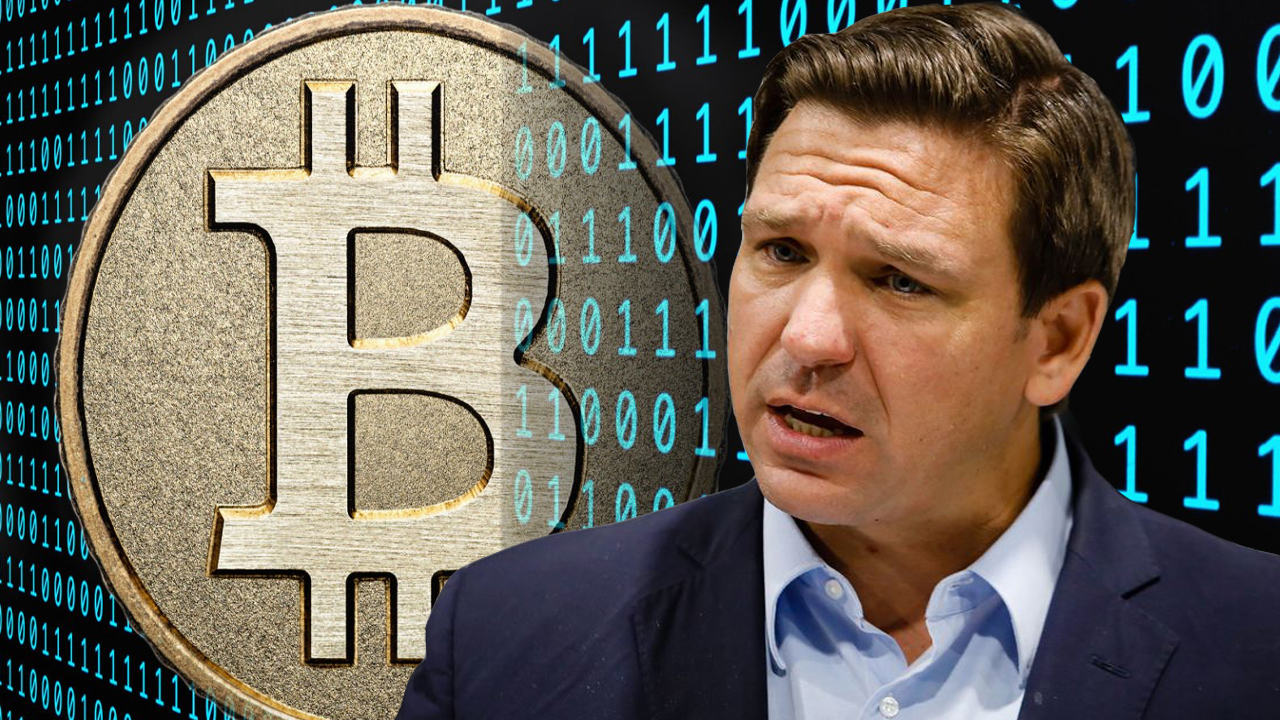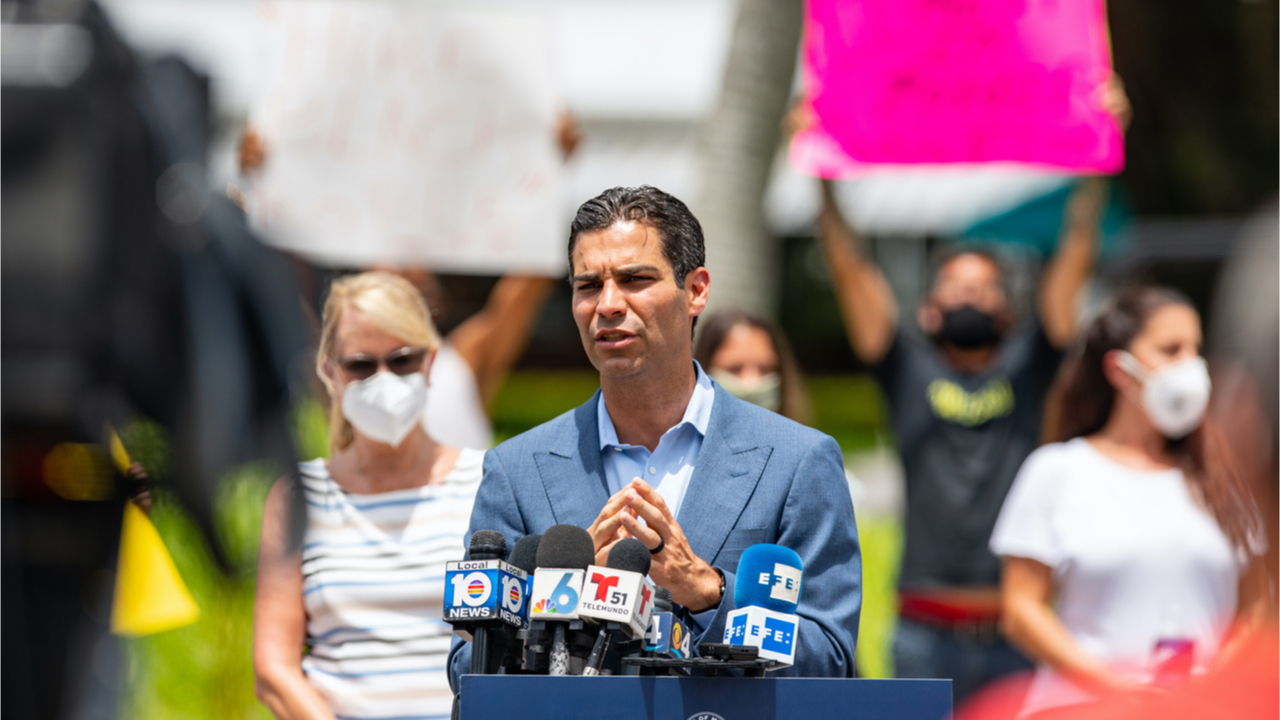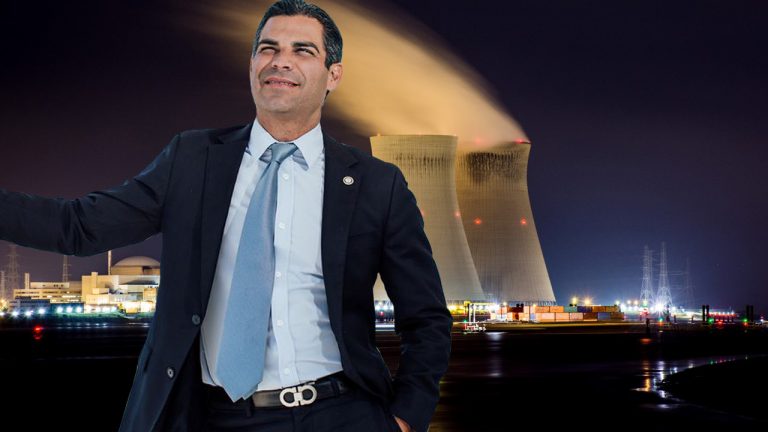 The American politician and attorney serving as the 46th governor of Florida, Ron DeSantis, announced the state’s 2022-23 budget proposal last week and proposed an idea to let businesses pay state fees with crypto assets. The governor’s “Freedom First Budget” suggests creating a department in Florida to accept state fees in cryptocurrencies. Florida Governor’s Freedom […]
The American politician and attorney serving as the 46th governor of Florida, Ron DeSantis, announced the state’s 2022-23 budget proposal last week and proposed an idea to let businesses pay state fees with crypto assets. The governor’s “Freedom First Budget” suggests creating a department in Florida to accept state fees in cryptocurrencies. Florida Governor’s Freedom […] During the first week of November, the reelected Miami mayor Francis Suarez explained that he would receive part of his salary in bitcoin via the payment processor Strike. A month later, speaking at Real Vision’s Takeover event in Las Vegas, Suarez revealed he plans to take part of his 401k in bitcoin as well. Pro-Bitcoin […]
During the first week of November, the reelected Miami mayor Francis Suarez explained that he would receive part of his salary in bitcoin via the payment processor Strike. A month later, speaking at Real Vision’s Takeover event in Las Vegas, Suarez revealed he plans to take part of his 401k in bitcoin as well. Pro-Bitcoin […]
The mayor of Miami plans to give residents a Bitcoin dividend, but what exactly does this mean, and is there any real utility in this move?
Miami is quickly becoming the crypto capital of the United States. In August of this year, the Magic City was the first state in the U.S. to launch MiamiCoin (MIA), its very own cryptocurrency used for civic engagement. A few months later, Mayor Francis Suarez announced that every Miami resident with a digital wallet will be eligible to receive a Bitcoin dividend.
While such a proposal would make Miami the first city in America to provide a Bitcoin (BTC) yield to its residents, Mayor Suarez told Cointelegraph that the City of Miami does not actually own or hold MiamiCoin, or any cryptocurrency for that matter.
According to Suarez, CityCoins is an independent community acting in its own capacity. “CityCoins launched MiamiCoin as a way for citizens to engage more intimately with their cities and their governments,” said Suarez. He further remarked that part of CityCoins’ mission is to build up the cities they aim to support by gifting 30% of all mining rewards to their namesake city.
Since rewards are distributed in cryptocurrency, CityCoins acts as a custodian of Miami’s rewards until they are converted into dollars and formally gifted to the City. Suarez explained:
“The reason Miami residents will be able to earn dividends in Bitcoin is because prior to the City receiving the cash gift from CityCoins, CityCoins can reinvest the rewards from MiamiCoin and earn a yield in Bitcoin. It is my intention that Miamians receive every cent of that yield. A community that invests in its city deserves to have that money reinvested back into the community.”
Patrick Stanley, community lead of CityCoins, further told Cointelegraph that since mining began for MiamiCoin on Aug. 4, Miami has generated over $22 million dollars. More importantly, Stanley pointed out that this amount is denominated in Stacks’ STX token. This is the case since CityCoins is a project built on Stacks, which is an open-source network of decentralized applications and smart contracts built adjacent to the Bitcoin blockchain.
According to Stanley, STX is yielding a 10% annual percentage yield in Bitcoin. Given this, he believes that in the next five to 10 years, every Miami resident could receive a couple hundred or even thousands of dollars per year in BTC if this approach continues. Stanley elaborated:
“The City of Miami will experiment with the BTC generated from their treasury to give their citizens USD. This is very powerful, as Mayor Suarez essentially activated all citizens to become supporters of the MiamiCoin protocol, which will also allow people to mint NFTs, build applications, and provide for crypto payments.”
Given the potential of MiamiCoin, Suarez remarked that he aims to allow every Miami resident the opportunity to partake in the crypto and blockchain movement. Stanley added that over $150,000 worth of art has been minted using MiamiCoin and that the protocol can also fuel smart contracts.
While MiamiCoin appears to be thriving, Suarez shared that he is fully aware of the legal hurdles and complexities that may arise from community adoption. “There’s no way to know how quickly we can make this into a reality,” he said.
Even though this is the case, it’s become clear that other innovative U.S. cities plan to follow Miami’s lead for implementing a CityCoin. Most recently New York City launched “NewYorkCityCoin” (NYCCoin), which occurred shortly after Mayor-elect Eric Adams stated that he wanted to turn New York into a crypto-friendly city. Stanley noted that a New York CityCoin was then voted on by the community once Adams mentioned the idea. “New York leapfrogged San Francisco because Mayor-elect Eric Adams was outspoken about the initiative,” explained Stanley.
Related: What can Eric Adams do? The limits of turning New York City into a crypto hub
Yet actions may speak louder than words in the case of CityCoins’ success rate. For instance, a Cointelegraph article recently pointed out that New Yorkers are unable to legally mine NYCCoin because residents have no compliant way of purchasing STX tokens. This is the case since the coin isn’t available on any exchange holding a BitLicense, which is required for residents purchasing crypto in New York City.
Interestingly enough, at the time of writing, over $7 million has been generated from mining NYCCoin since mining began on Nov. 11. Yet Stanley noted that one doesn’t need to be a resident of the city that CityCoin represents in order to mine it:
“MiamiCoin is an open-membership protocol. You only need a web wallet and to choose the CityCoin you wish to mine and then forward over the Stack’s payment.”
Stanley added that an Austin CityCoin may be next, given Austin Mayor Steve Adler’s interest in cryptocurrency.
Challenges aside, it’s important to point out that crypto education may be a driving factor for cities wishing to adopt CityCoins. For example, Adams recently mentioned that he wants crypto education taught in New York City schools.
Echoing Adams, Suarez explained that Miami has identified the need for a more comprehensive educational curriculum in order to prepare students for the next generation of technology and finance:
“We’re already exploring the expansion of Miami’s charter school network in an effort to deliver this more industry-tailored education. The City of Miami currently has $20 million reserved in its designated wallet and we are expecting to receive $4 million–$5 million sometime this week. We have a lot of ideas for how we can spend the money, and we fully intend to listen to the community’s input as to how to deploy the funds.”
While the idea of crypto education is on the horizon for both New York City and Miami, Suarez added that a six-month freeze has been placed on spending any MiamiCoin funds in order to best assess community needs. “We’re already speaking to a number of leaders in the Bitcoin community to explore wallet options and technologies like Lightning — we’re going to take our time making sure we get the technology and education pieces right,” he said.

"I look forward to the friendly competition in making our respective cities a crypto capital," said recently re-elected Miami Mayor Francis Suarez.
Newly elected New York City Mayor Eric Adams has reiterated his pledge to make the city a crypto hub by accepting his first three paychecks entirely in Bitcoin.
In a Nov. 4 response on Twitter to Francis Suarez — re-elected for another term as of Tuesday — Adams said he would be matching the Miami mayor’s pledge to accept his next paycheck in Bitcoin (BTC) in addition to the following two payments. Assuming Adams accepts a base salary of $258,750, his monthly paychecks would be roughly $21,562 each, a total of 1.05 BTC at a price of $61,268.
In New York we always go big, so I’m going to take my first THREE paychecks in Bitcoin when I become mayor. NYC is going to be the center of the cryptocurrency industry and other fast-growing, innovative industries! Just wait!
— Eric Adams (@ericadamsfornyc) November 4, 2021
The incoming NYC mayor’s social media banter comes less than two days after winning the city election with 72.8% of the vote. He is expected to take office on Jan. 1, so there is always the possibility the BTC price could change significantly before Adams is sworn in. The crypto asset has experienced significant volatility this month, rising more than 10% from under $50,000 in early October to $61,268 at the time of publication.
Both Adams and Suarez, as a political candidate and public servant, respectively, have advocated for their cities to be crypto hubs in the United States. The mayor-elect said he planned to make New York City “the center of Bitcoins” if he won his race, while Suarez has been vocal about his intentions to make Miami the city with “the most progressive crypto laws” in the United States.
Suarez’s response to Adams’ paycheck ‘challenge’ hints that the Miami mayor sees their race to adopt Bitcoin as anything but hostile. However, Adams would likely receive significantly more BTC from his paychecks, given his $258,750 annual salary to Suarez’s estimated $97,000.
“Congrats on the election, said Suarez. “I look forward to the friendly competition in making our respective cities a crypto capital.”
Related: Crypto City: Guide to New York
Both New York City and Miami have often been the focus of many in the crypto space due to precedent-setting policy and events. In June, President Nayib Bukele announced his plans to make BTC legal tender in El Salvador at the Bitcoin 2021 conference in Miami. In addition, the New York Attorney General’s office has been responsible for many enforcement cases against crypto firms including Coinseed, Bitfinex, and Tether.
 The mayor of the U.S. city of Miami says that he is going to take 100% of his next paycheck in bitcoin and become the first American politician to accept a salary in cryptocurrency. The mayor is currently trying to build his city into a bitcoin capital of the world. US Politician Wants to Be […]
The mayor of the U.S. city of Miami says that he is going to take 100% of his next paycheck in bitcoin and become the first American politician to accept a salary in cryptocurrency. The mayor is currently trying to build his city into a bitcoin capital of the world. US Politician Wants to Be […] Miami Mayor Francis Suarez says that cryptocurrency is a “major priority” for him as he attempts to build his city into the crypto capital of the world. “I want us to differentiate ourselves as a crypto capital of the United States or of the world,” he said. ‘Major Priority’ — Miami Aims to Become Crypto […]
Miami Mayor Francis Suarez says that cryptocurrency is a “major priority” for him as he attempts to build his city into the crypto capital of the world. “I want us to differentiate ourselves as a crypto capital of the United States or of the world,” he said. ‘Major Priority’ — Miami Aims to Become Crypto […] Several U.S. lawmakers see China’s authoritarian crackdown on cryptocurrency, including bitcoin, as “a perfect opportunity for American leadership on cryptocurrency.” One senator noted that it is “a reminder of our huge structural advantage over China.” US Lawmakers Comment on China’s Cryptocurrency Crackdown Following the latest news of China’s crackdown on cryptocurrency, several U.S. lawmakers have […]
Several U.S. lawmakers see China’s authoritarian crackdown on cryptocurrency, including bitcoin, as “a perfect opportunity for American leadership on cryptocurrency.” One senator noted that it is “a reminder of our huge structural advantage over China.” US Lawmakers Comment on China’s Cryptocurrency Crackdown Following the latest news of China’s crackdown on cryptocurrency, several U.S. lawmakers have […] Jackson, Tennessee’s mayor is a fan of bitcoin and he wants the city to become a bitcoin hub in order to entice technology companies and innovation. Jackson’s mayor Scott Conger is in the midst of discussing creating legislation that allows Jackson residents to pay property taxes with bitcoin. Jackson, Tennessee’s Mayor Is a Fan of […]
Jackson, Tennessee’s mayor is a fan of bitcoin and he wants the city to become a bitcoin hub in order to entice technology companies and innovation. Jackson’s mayor Scott Conger is in the midst of discussing creating legislation that allows Jackson residents to pay property taxes with bitcoin. Jackson, Tennessee’s Mayor Is a Fan of […] Miami’s Mayor Francis Suarez told the press on Thursday that his city was open to bitcoin miners from China who are flocking to find new homes. Suarez says he hasn’t actually talked to any miners from China but said he wants them to know the opportunity is there. Miami’s Mayor Says City Is Open to […]
Miami’s Mayor Francis Suarez told the press on Thursday that his city was open to bitcoin miners from China who are flocking to find new homes. Suarez says he hasn’t actually talked to any miners from China but said he wants them to know the opportunity is there. Miami’s Mayor Says City Is Open to […]